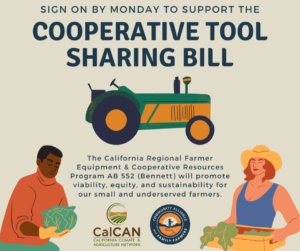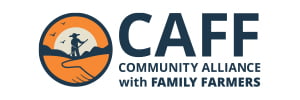
SIGN ON TODAY!
Summary
Community Alliance with Family Farmers (CAFF) and the California Climate & Agriculture Network (CalCAN) are sponsoring AB 552 to create the California Small & Underserved Farmer Equipment & Cooperative Resources program at the Department of Conservation(DOC) to facilitate a competitive grant program. Eligible groups for the grants include Resource Conservation Districts, UC Cooperative Extension offices, Agricultural Commissioners, Tribal Communities & Governments, as well as appropriate non-profit organizations and farmer cooperatives. The program will support small farm equipment lending programs across the state by funding both existing and new programs to purchase equipment, infrastructure, and associated costs.
Please sign on to our letter in support by Monday March 13 at 10am
Background
While California leads the nation in agricultural production, the number of family farms decreases with each agricultural census as farmers face a myriad of pressures and challenges including increased costs, drought, and corporate consolidation. Small-scale, historically underserved, and beginning farmers and ranchers face significant barriers in accessing infrastructure resources to grow and support their agricultural operations and there is little infrastructure or technical support available.
After land, the purchase of farm equipment and infrastructure is the second largest capital investment and remains inaccessible for small, underserved and beginning farmers with limited cash flow for major purchases. These small-scale and often biologically diverse farming operations require a greater variety of costly equipment and some high-capital equipment is only used a few times a year. Cooperatively managed equipment sharing can help address these infrastructure barriers and increase farm viability, while supporting implementation of conservation practices and maximizing efficient use of equipment.
Equipment sharing programs allow farmers to borrow or lease high-value equipment from regional agricultural centers such as fairgrounds, universities, cooperative extension offices, farmer cooperatives, and resource conservation districts (RCD). These programs aim to alleviate the financial burden for farmers, increase on-farm safety, reduce emissions, incentivize conservation practices, and provide necessary resources to producers. There is evidence of successful state-government-run equipment sharing programs in states like Maryland and New Hampshire, as well as numerous non-profit-run programs.
Equipment-sharing programs can especially alleviate major costs for beginning farmers and farmers looking to adopt conservation practices. For example, for equipment such as a wood chipper, compost spreader or seed-drill, which supports farmers to implement conservation practices that protect and improve soil health and sequester carbon, costs can start at $5,000. In California, nearly 75 percent of farmers operate on less than $100,000 in gross sales, therefore high-value equipment is out of financial reach for these growers. Furthermore, as the majority of beginning farmers fail in the first year of operation often due to major infrastructure costs, shared equipment such as cold storage (starting cost $6,000) or other shared infrastructure could alleviate major costs and allow them to successfully enter into the farming industry. Equipment sharing will also increase the capacity for small farmers to reduce emissions through adopting climate-smart agricultural practices and utilizing low emission equipment (e.g. electric tractor) by making the necessary infrastructure available to them.
Equipment sharing programs tied with essential technical resources and assistance from equipment maintenance, innovation, and farmer cooperatives models can support farmers to develop greater community-based sharing economies and increase community bonds between farmers. Offering training programs on equipment and cooperatives models through these equipment sharing hubs can help small and undeserved farmers organize to share other essential resources such as knowledge and build farmer relationships.
Proposal
AB 552 creates the California Regional Farmer Equipment & Cooperative Resources program at DOC to facilitate a competitive grant program. Eligible groups for the grants include, but not limited to RCDs, UC Cooperative Extension offices, Agricultural Commissioners, Tribal Communities & Governments, as well as appropriate non-profit organizations and farmer cooperatives. The program will support small farm equipment lending programs across the state by funding both existing and new programs to purchase equipment, infrastructure, maintenance, and training, as well as some personnel costs. Furthermore, this program would support essential training for farmers on new and innovative small-farm equipment, equipment maintenance, as well as cooperative development on how to participate and design farmer cooperatives.
Through the competitive grant program applicants will need to detail the types of equipment(e.g. urban agriculture will have a different scale of equipment), how the lending program will work, the types of farmers they aim to serve, the technical assistance that will be offered, as well as how the program will be sustainable after the grant program. This program will specifically prioritize programs which aim to support socially disadvantaged farmers and ranchers, small and mid-sized farms, and limited resource farmers.
Sponsors:
Community Alliance with Family Farmers (CAFF)
Jamie Fanous, Policy Director
California Climate & Agriculture Network (CalCAN)
Anna Larson, Policy Associate
RMarcus Government Strategies
Rebecca Marcus

